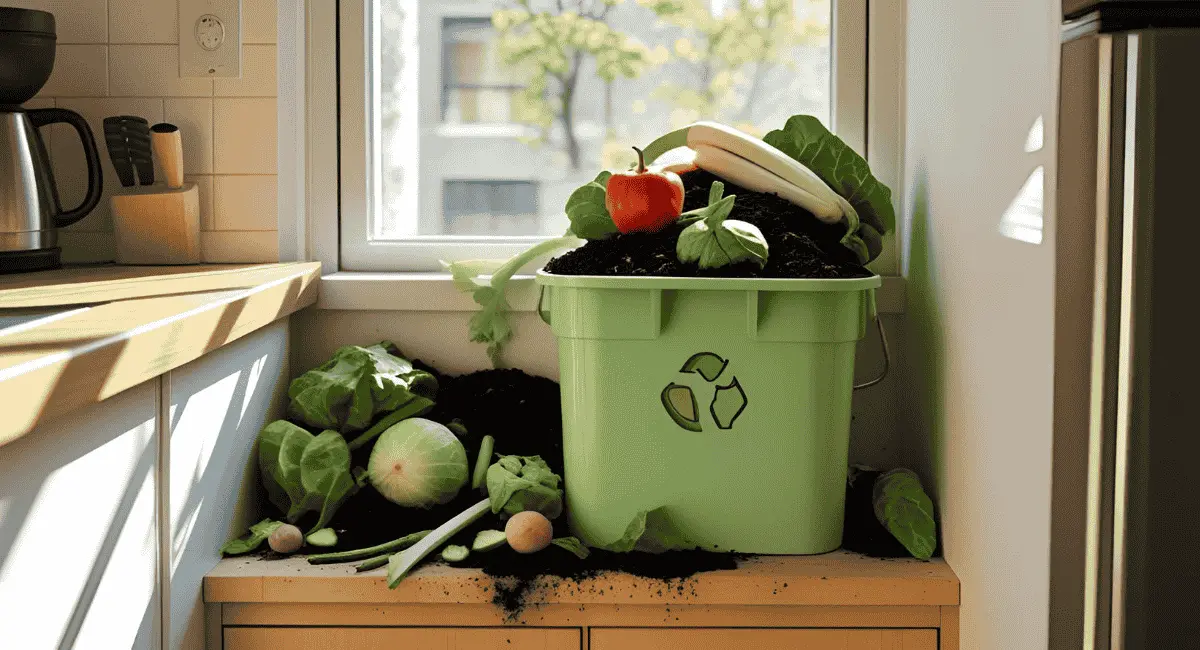I want to tell you something cool I started doing a while back. I live in a small apartment with not much space, but I really wanted to compost my food scraps. I thought it would smell bad or take up too much room, but guess what? It was way easier than I thought! If I can do it, you can too. Let’s talk about how you can start composting in small apartments and help the planet while keeping your home fresh and clean.
Why Composting Is Great for Apartment Living
Composting is not just for people with big gardens. You can do it in a tiny kitchen! It helps cut down trash, makes less smell in your garbage, and creates something called compost, which is great for plants. It’s part of sustainable living, and it feels good to do your part.
Easy Composting Methods You Can Try
There are a few ways you can compost inside your home. Here are the most popular and easy ones:
1. Worm Bin (Vermicomposting)
This sounds gross but trust me, it’s not. A worm bin is a small box where special worms eat your food scraps and turn them into compost. It doesn’t smell if you do it right. This is called vermicomposting.
Tip: Keep the worm bin in a dark, quiet place like under your sink.
2. Bokashi Composting
This is a fun word to say! Bokashi composting uses a small bin and some special grains that help your food break down. It’s fast and works great indoors. Plus, it doesn’t stink if you keep it sealed.
3. DIY Compost Bin
You can make your own bin using a plastic container with a lid. Just poke a few holes in it for air. It’s a cheap way to start indoor composting.
What Can You Compost?
Here’s what you can toss into your bin: Green materials like fruit peels, veggie scraps, and coffee grounds, and Brown materials like dry leaves, cardboard pieces, and paper towels. These mix together to make compost.
Don’t Compost These: Meat, dairy, oily foods, and pet poop. These can smell bad and attract bugs. Stick with plant stuff!
Kitchen Composting Tips (No Bad Smell!)
I keep a small bin on my kitchen counter for my scraps. It’s called a kitchen composting bin. It has a tight lid so it doesn’t smell. Every few days, I add some dry stuff like shredded paper (brown material) to balance the wet food (green material).
Odor Control Tips: Keep a good mix of greens and browns, don’t add too much water, and stir the bin now and then.
Taking Care of Your Compost (Compost Maintenance)
It’s not hard! Here’s how I keep my compost happy: Turn it to mix it up now and then to add air, check moisture to make sure it’s like a damp sponge, and watch the smell—if it stinks, add more brown stuff like cardboard.
You don’t need many composting tools just a small trowel or spoon to mix.
What to Do With the Finished Compost
Once it’s ready, you can feed your indoor plants, give it to a friend with a garden, or use it to make compost tea (a drink for your plants, not you!).
No Time or Space? Try These!
If bins aren’t for you, try: Compost pickup services some cities pick it up with trash, or Compost drop-off some grocery stores or gardens take your scraps. I used to drop mine at the local farmer’s market before I got my worm bin.
How to Maintain Your Indoor Compost Like a Pro
Caring for your compost doesn’t have to be a chore. Here’s what I do:
Stir Regularly
Give your compost a little mix every few days. This keeps oxygen flowing and helps materials break down faster.
Watch the Moisture
The compost should feel like a wrung-out sponge—not too wet, not too dry. Add dry materials if it’s soggy or a splash of water if it’s too dry.
Keep an Eye (Or Nose) on It
If it starts to smell funky, that’s your sign to add more browns or stir it up. Trust your nose—it usually knows when something’s off.
Mistakes to Avoid (And How to Fix Them)
We all mess up, and that’s okay! Here are some things I learned the hard way:
Mistake 1: Too wet and smelly
Fix: Add dry paper or cardboard
Mistake 2: Too dry, nothing breaks down
Fix: Add more food scraps or a little water
Mistake 3: Fruit flies
Fix: Bury the scraps under dry stuff
Mistake 4: Adding the wrong stuff
Fix: Double-check the non-compostable items list above
Final Thoughts: You Got This!
Composting in small apartments isn’t hard. You just need the right method and a little patience. Start small, maybe with a DIY bin or a Bokashi kit. I promise it’ll feel awesome to turn your trash into treasure.
Give it a try and see how easy it is. And if you’ve already started, let me know what’s working for you!


